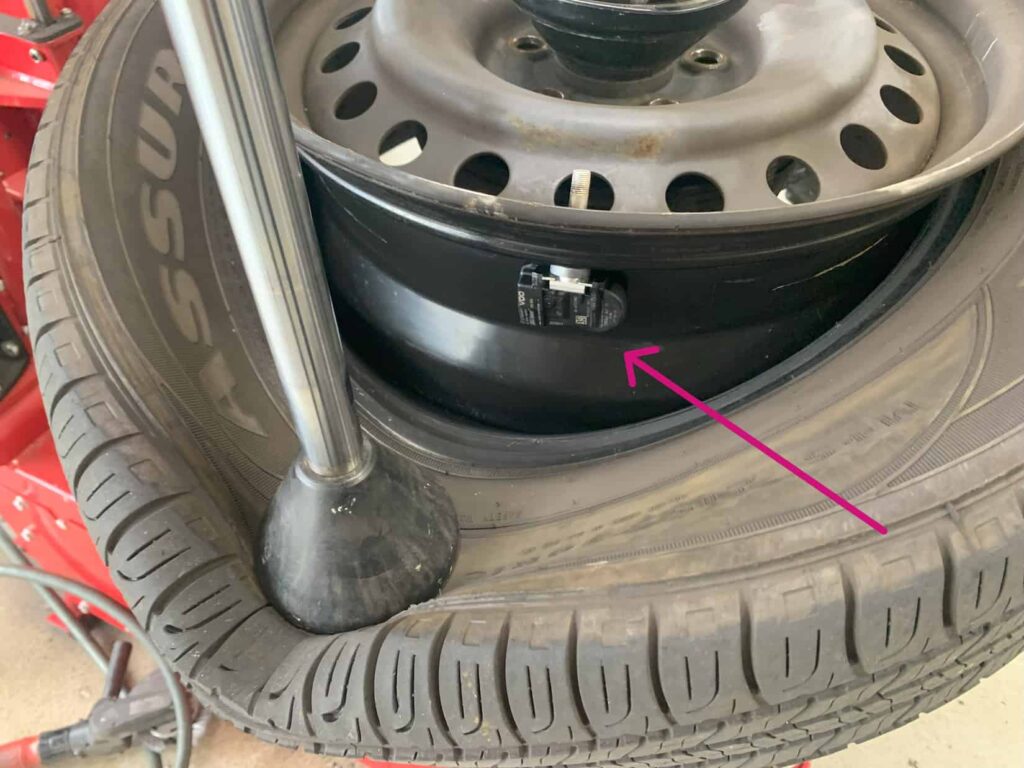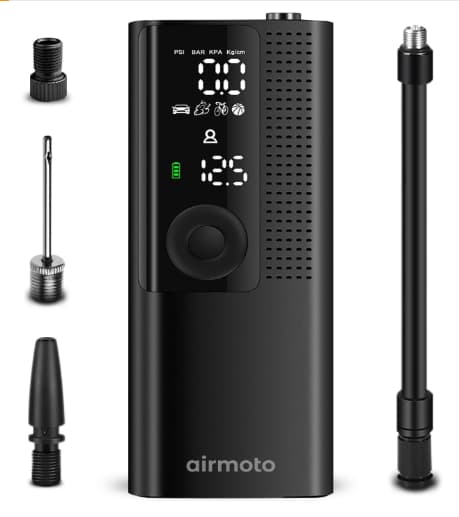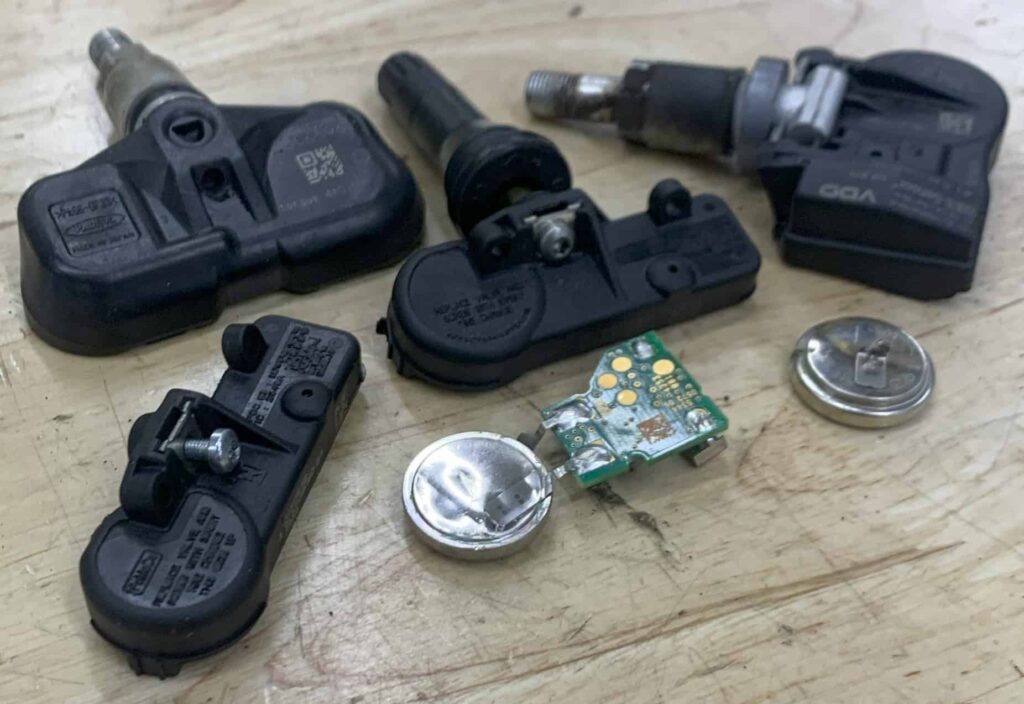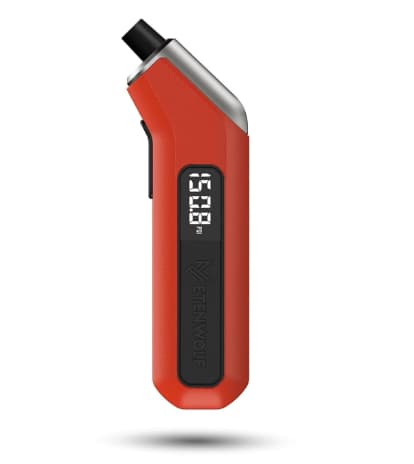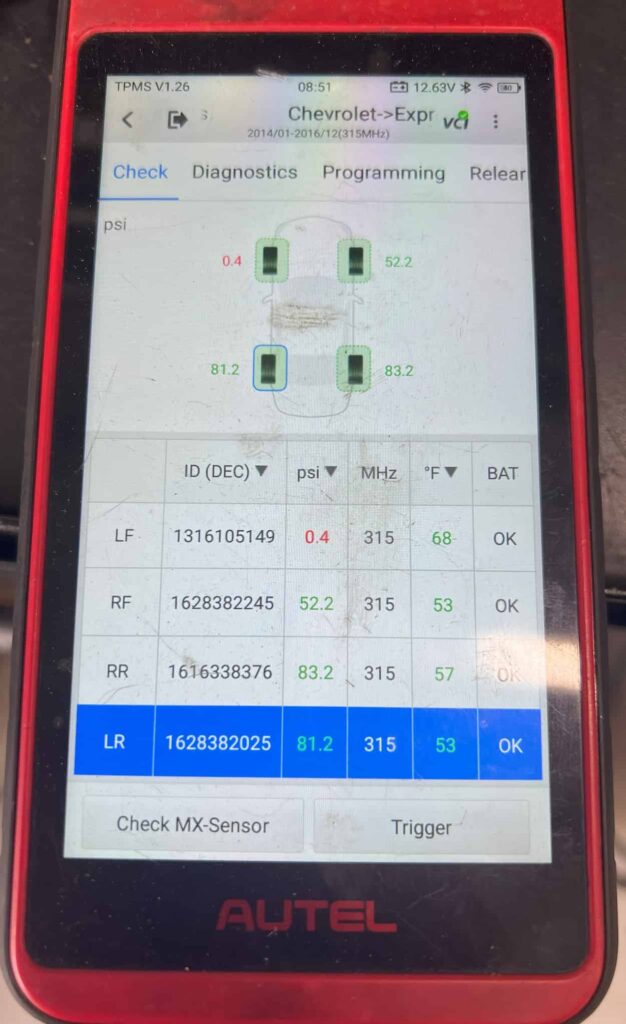STEPS TO RESET GENESIS GV80 TIRE PRESSURE LIGHT
Fill all 4 tires to the recommended tire pressure levels.
Drive the Genesis GV80 for approximately 10 minutes at speeds above 16 Mph (25km/h).
As you drive you may see a “Drive to Display” message on the tire pressure display screen. Continue driving until this message disappears.
NOTE: A Genesis GV80 tire pressure reset button does not exist!
STEPS TO CHANGE GENESIS GV80 TIRE PRESSURE UNITS
Turn the Genesis engine on or press the Start button twice without your foot on the brake.
Press the MENU button.
Use the Scroll wheel to scroll through the Menu display and select SETUP.
Scroll down and select GENERAL.
Scroll down and select UNITS.
Select TIRE AIR PRESSURE UNITS.
Choose between psi, kPa, or bar.
GENESIS GV80 TIRE AIR PRESSURE
TIRE SIZE | FRONT PSI | REAR PSI |
265/55R19 | 33 | 36 |
265/50R20 | 33 | 36 |
265/40R22 | 33 | 36 |
WHAT IS THE GENESIS GV80 TPMS?
The Genesis GV80 TPMS is the vehicle’s tire pressure monitoring system. It is an essential safety feature of the car. The Genesis tire pressure system measures the air pressure in each of its four tires and can also alert the driver when there’s a tire losing air or having a TPMS sensor malfunction.
HOW DOES THE GENESIS GV80 TPMS WORK?
Tire Pressure Sensors in Genesis GV80: Each Genesis GV80 tire pressure sensor is made up of a chip, a battery, and a radio transmitter, all enclosed in a small plastic case with an attached valve stem. The chip, powered by the battery, measures the tire’s air pressure and the transmitter sends this data to the Genesis TPMS receiver module using radio waves.
TPMS Receiver Module: The Genesis GV80 TPMS receiver module receives air pressure data from each tire and relays it to the car’s on board computer, known as the ECU.
Genesis GV80 ECU: The ECU processes the tire pressure data and checks it against the manufacturer’s preset air pressure levels. If it detects a significant discrepancy, like a tire with 24 PSI instead of the recommended 36 PSI, it triggers a Low Tire Pressure warning on the dashboard display to alert the driver.
FIRST THING TO DO WHEN THE LOW TIRE LIGHT TURNS ON
When your Genesis GV80 low tire pressure light comes on, stop the car and check out each tire for any signs of a problem. Use a digital tire pressure gauge to measure the air pressures of each tire.
WHY IS THE GENESIS GV80 LOW TIRE PRESSURE WARNING LIGHT ON?
Incorrect tire pressure, either too high or too low.
Use of the spare tire. (Genesis GV80 spare tire does not have a tire pressure sensor in it)
Weak or dead batteries in TPMS sensors.
Problems with TPMS receiver or on-board computer, including software issues.
Electromagnetic interference from nearby vehicles or devices.
Changes in air temperature.
Overloading the vehicle or exceeding towing limits.
Using tire chains.
Very dark tinting on vehicle windows.
Changes in road surface temperature.
Using incorrect size tires or non-standard Genesis GV80 wheels.
TPMS sensor damage during tire replacement or service.
Failing to follow the Genesis GV80 TPMS reset procedure after tire maintenance.
Physical damage to tires or wheels such as tire bubbles or cracked rims.
COLD TIRES
Only adjust your Genesis GV80 tire air pressure when the tires are cold. This is because measuring and inflating warm tires will cause overinflation. Tires are officially cold either before being driven on or waiting at least 3 hours after they were last driven on.
HOT TIRES AND OVERINFLATION RISKS
When you drive your Genesis GV80, the tires heat up which causes the air pressure to increase. This means that if you check your tire pressure after driving, the air pressure will show a higher reading than they actually are.
IMPACT OF HIGH ALTITUDE ON GENESIS GV80 TIRE PRESSURE
The Genesis GV80 low tire warning light is unlikely to activate simply due to ascending to a higher altitude. As you gain elevation, the internal pressure of the tires tends to increase. For every 1,000 feet of elevation gained, the tire pressure typically rises by approximately 0.5 Psi.
GENESIS GV80 TIRE PRESSURE SENSOR BATTERIES
Each Genesis GV80 tire pressure sensor is powered by a silver oxide battery that cannot be replaced or recharged. Tire pressure sensor batteries have a lifespan ranging from 5 to 10 years, or roughly 100,000 miles. If a Genesis GV80 tire pressure sensor battery is depleted, the whole sensor needs to be substituted with a new one.
IS IT SAFE TO DRIVE THE GENESIS GV80 WITH THE TIRE PRESSURE LIGHT ON?
We do not recommend driving your Genesis GV80 with the low tire pressure light on. If your tire is losing air, it’s important to get it fixed or replaced immediately. However, if the low tire pressure warning is due to a dead battery in a tire pressure sensor, it’s still safe to drive as long as the tires maintain the proper air pressure.
HOW FAR CAN YOU DRIVE THE GENESIS GV80 WITH THE TIRE LIGHT ON?
There isn’t a specific distance, duration, or established guideline for safely driving a Genesis GV80 when the low tire pressure light is on.
GENESIS GV80 TIRE PRESSURE SENSORS WITH NEW WHEELS OR TIRES
When changing the wheels or rims of your Genesis GV80, you have a couple of choices:
Transfer the original Genesis GV80 tire pressure sensors from the old wheels to the new ones.
Buy programmable tire pressure sensors, fit them onto the new wheels and then sync them with the Genesis GV80 on board computer using a special TPMS tool.
If you’re just replacing the tires on your Genesis GV80, simply follow the procedure for resetting the Genesis GV80 tire pressure light.
NOTE: If you are using snow tires or seasonal tires, the options remain the same.
WHY IS THE GENESIS GV80 TIRE LIGHT FLASHING?
If the Genesis GV80 tire light is flashing it indicates that at least one of the tire pressure sensors is unable to communicate with the vehicle’s on-board computer. This is also referred to as a TPMS malfunction. This issue can arise due to one of three reasons:
The spare tire is being used on the Genesis GV80. (The Genesis spare tire does not have a tire pressure sensor within it.)
The battery of a tire pressure sensor is depleted or running low.
A tire pressure sensor has sustained damage and is no longer able to communicate with the vehicle TPMS.
CAN THE GENESIS GV80 TPMS BE DISABLED?
No, the Genesis GV80 tire pressure monitoring system cannot be turned off or disabled. Removing the tire pressure sensors from each tire will simply cause a TPMS malfunction.
SPECIAL TPMS TOOLS
If the tires are all at the correct pressure, you follow the Genesis GV80 TPMS reset procedure, and the tire pressure light remains on or is blinking and then remains on, you need a special TPMS tool to determine the issue. Diagnostic tools for tire pressure systems are highly effective for examining and diagnosing tire pressure sensors. These tools can assess each sensor and generate a report detailing the condition of the sensor’s battery, its signal quality, the tire’s temperature, the sensor’s MHz frequency, and the location of the sensor on the vehicle. If TPMS Sensors exhibit problems such as a low battery or weak signal, they need to be replaced.
IMPACT OF TEMPERATURE DROPS ON GENESIS GV80 TIRE PRESSURE
A frequent reason for the Genesis GV80 low tire pressure warning is a change in weather conditions. Tire pressure typically fluctuates by about 1 Psi with every 10°F change in ambient air temperature. For instance, if the temperature drops by 38°F within a couple of weeks, the tire pressure could decrease from 36 Psi to 32 Psi or less, triggering the Genesis GV80 low tire pressure indicator. Since air temperature changes are a common occurrence (depending on your location), it’s advisable to check your tire pressure regularly. We recommend checking about every few weeks and make sure to do so when the tires are cold for accurate readings (before driving).
WHY IS THE TIRE WARNING LIGHT ON IF THE TIRES LOOK FINE?
Avoid judging the condition of your tires just by their appearance. If you suspect an issue, always use a digital tire pressure gauge to manually check the air pressure of your Genesis tires. When the low tire pressure indicator shuts off after you’ve added air, it indicates that the GV80 TPMS is functioning properly.
FINDING A TIRE LEAK
To precisely locate a leak in a tire, follow these steps:
Inflate the tire with the leak to 40 Psi.
Prepare a mixture of water and liquid soap in a spray bottle.
Liberally apply the soapy solution across the tire, focusing especially on the bead and valve stem areas.
Look for any bubbles forming and trace them back to their source to identify the leak’s location.
RESETTING TPMS FAULT CODES
If your Genesis GV80 tire pressure light doesn’t go off after resetting the tire pressure system, you might consider disconnecting the vehicle’s main 12-volt battery to reset any temporary TPMS fault codes in the car’s on board computer. Here’s how to do it:
Ensure the engine is off and all electronic devices such as the radio and lights are turned off.
Loosen and remove the negative terminal clamp from the battery.
Wait for a short period before reattaching and securing the terminal.
This process should deactivate the low tire pressure indicator. However, if the tire light reactivates while driving, this could indicate an issue with a tire pressure sensor or a tire that is leaking air.
THE IMPORTANCE OF CORRECT TIRE PRESSURE
Keeping the right tire pressure in your Genesis GV80 is essential for getting good gas mileage. When tires are underinflated, they create more resistance as the car moves, forcing the engine to use more effort and thus consume more fuel. A drop of 1 Psi in all tires can lead to a 0.2% reduction in fuel efficiency. To put it in perspective for a vehicle like the Genesis GV80, which typically gets 21-25 MPG, this fuel reduction translates to using around one more gallon of fuel for every 2,500 miles you drive.
ARE TIRE PLUGS SAFE?
Based on my 10 years of experience working in dealerships and private automotive shops, tire plugs are safe when used properly. They are safe for repairing tire punctures on the tread of the tire. If the puncture is on the sidewall of the tire or the tire tread is worn, replace the tire.
DO TIRE SEALANTS DAMAGE TIRE SENSORS?
After using a tire sealant on a leaking tire, have the tire pressure sensor tested and checked to make sure its functioning properly.
Everything in this article is applicable to all Genesis GV80 models and versions built between 2020-2025.
Please note that this blog post contains Amazon affiliate links. This means that if you make a purchase through one of these links, we at TPMSRESET.COM may earn a small commission at no extra cost to you. We only recommend products that we personally use and believe in. Thank you for supporting us.

